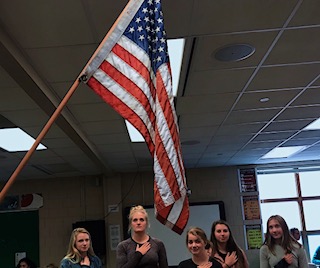Schools should provide opportunities for weekly Pledge
September 25, 2018

A group of students gather around the flag to recite the Pledge of Allegiance. Students recite the Pledge once a week.
Now that students are back in school, the controversy around the reciting of the Pledge of Allegiance will most certainly surface again. There was a time when students stood with hand over heart and recite the Pledge every day without much fanfare. Those days are long gone, and the divide between pro and con runs deep.
What used to be a straightforward disagreement about the separation of church and state has morphed into a much more heated argument about the history and values of the United States of America. As a result, and with help from the state, Minnesota schools are now rethinking about how to deal with the Pledge in order to avoid this tension.
Schools should be encouraging students to stand and recite the Pledge of Allegiance every day. Students are a part of a country that has a shared value system. The Pledge is an exercise that is there to reinforce those values. The Pledge should not be looked at as something divisive, but rather as something that brings us together.
The 2017 Minnesota Statute 121A.11 states all public schools and charter schools must recite the pledge “one or more times each week.” Our school has opted to follow this statute’s bare minimum and recite the Pledge only once a week. It is unfortunate we have gotten to the point where we need the government to dictate rules around reciting the Pledge. Schools can now use these guidelines as a fall back when implementing the Pledge of Allegiance instead of being able to proudly and enthusiastically accept it as a common practice.
“In today’s age, we live in a pretty heightened polarized political climate. It serves as a good reminder to talk through rules to just be upfront with people so we can say, hey, we covered this,” Principal Rob Bach explained.
Statute 121A.11 also states “any student or teacher may decline to participate in recitation of the Pledge.” This law contradicts itself. First, it set a minimum standard for schools to recite the Pledge, yet allows people to opt out. It’s the lawmakers way to please everyone. It has nothing to do with being patriotic and enthusiastic about our country’s values.
Bach said our school has a pretty respectful culture and that part of the idea behind the Pledge and part of the statute is the idea that individuals have to recognize other individuals right to participate or not participate.
“I personally think that we should stand, but it’s up to them. It is their right to sit,” senior Victoria Caliguire added.
The Pledge of Allegiance represents the values, culture and history of our great country. Living in a country where people have fought for our freedoms should encourage reciting the Pledge with pride and honor. Having the right to disrespect or disregard the Pledge makes it all the more important to honor those freedoms by reciting it.
“I think it is very important to ensure that our American values are shown while at school because it is the same American Values that put us in it,” junior Ryan Ciminski said.
The Pledge of Allegiance has become so controversial that some individuals at our school would not share their thoughts on record. It is a shame that the Pledge, which represents America’s freedoms, including freedom of speech, has become a topic that most people are afraid to talk about in fear of disagreeing with someone else.
Government teacher Roger Stippel explained, “It’s a pretty simple question. But obviously they don’t see it that way. And them not seeing it that way, that would definitely imply that this is a divisive issue.”
Our school will now recite the Pledge of Allegiance, but not because students and staff are proud to, but because it is required. Hopefully someday our school, as well as schools around the nation, will be able to recite the Pledge and not be ashamed of it.









